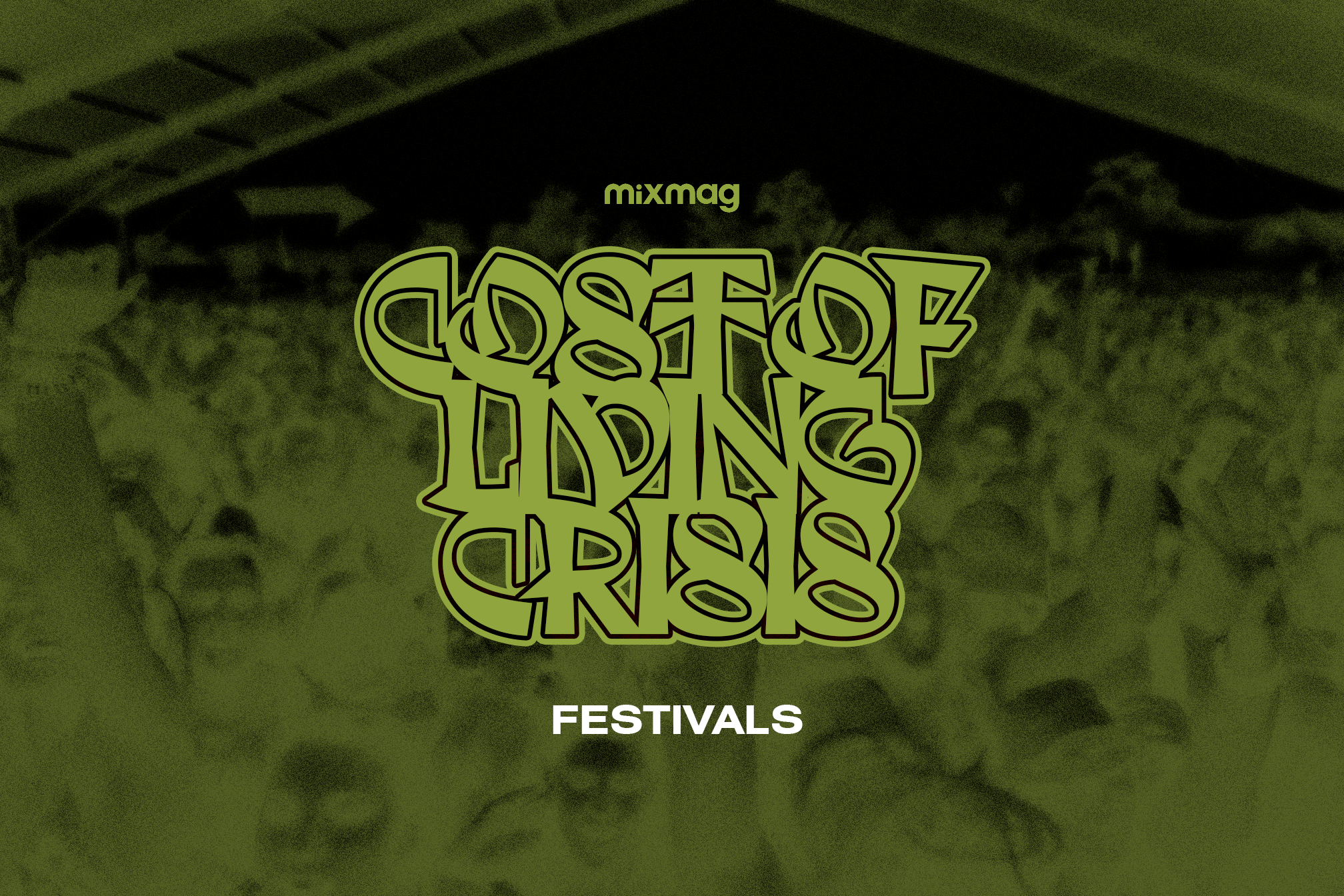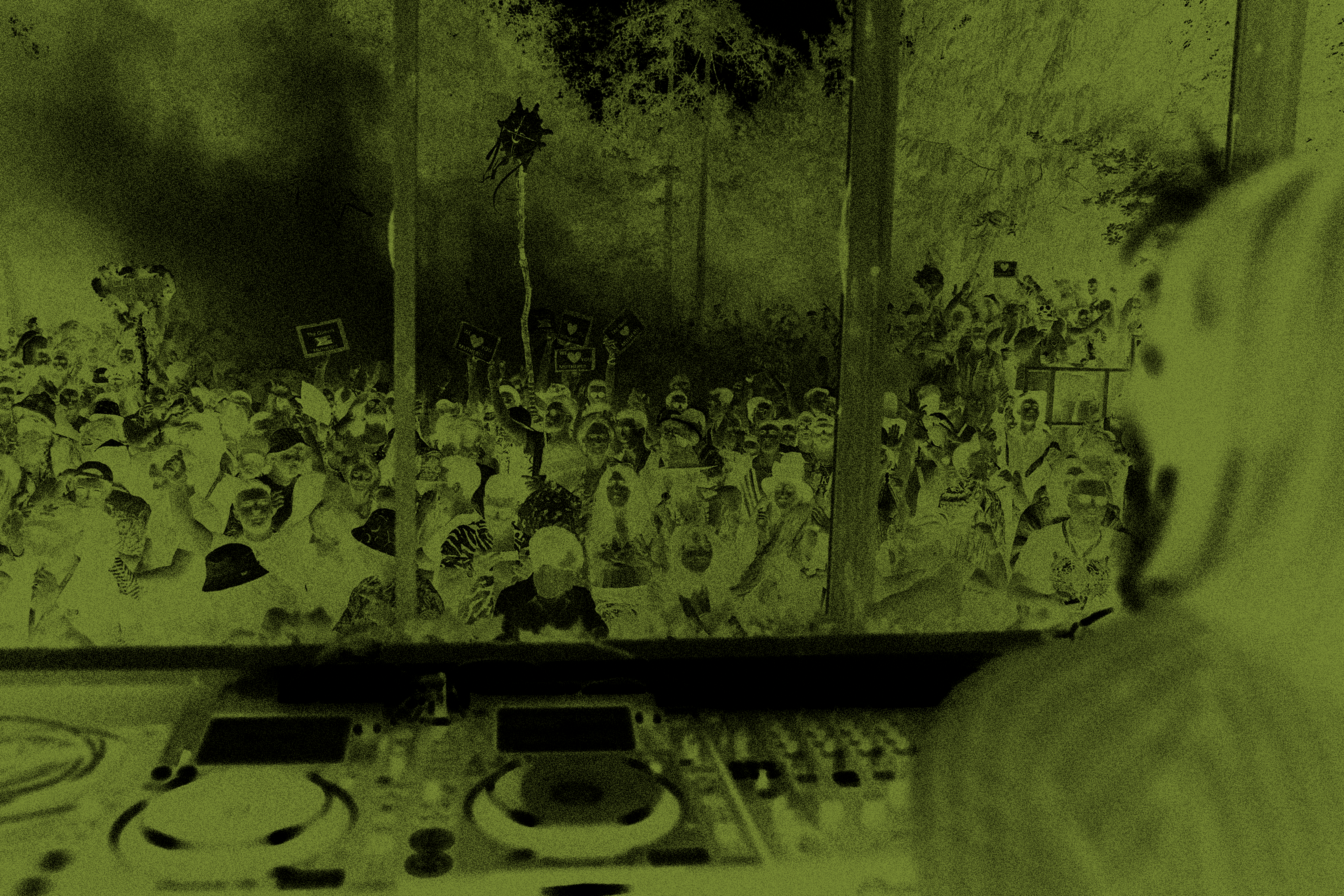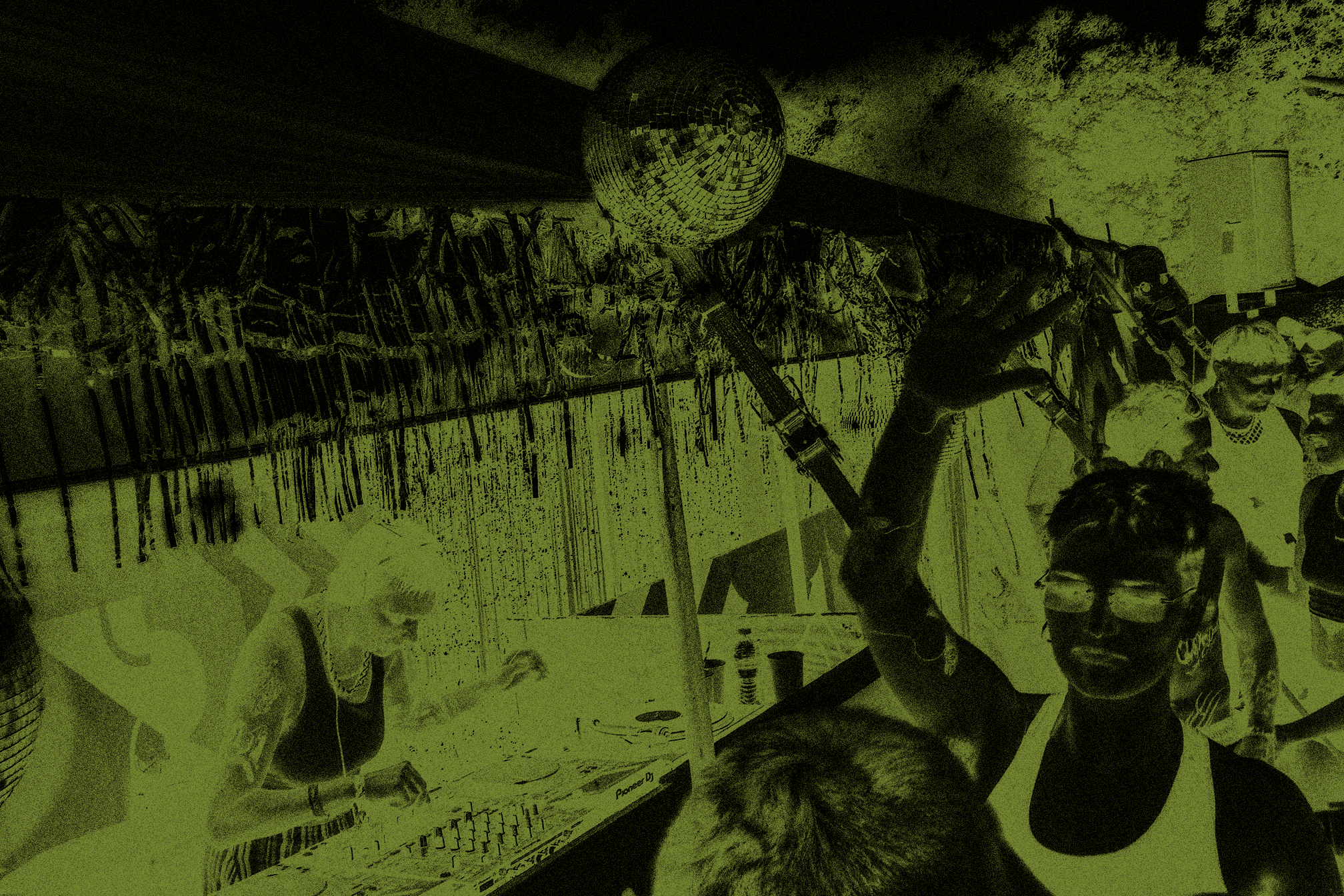 Features
Features
How The Cost Of Living Crisis Is Impacting Festivals
For the second part of our Cost of Living crisis, Isaac Muk looks at how soaring costs and changing consumer habits could spell a tough summer ahead for festival organisers
This article is part of Mixmag's Cost of Living series exploring how the current economic crisis is impacting dance music. For more features and a list of resources available to UK residents, click here.
The Blighty music festival experience is a unique one. They can be an opportunity to see your favourite artists and even more that you've yet to discover, a sun-drenched expanse or muddy inescapable cesspit (weather depending), a reverent gathering of thousands of likeminded people, the place you have formed lifelong friendships or even fallen in love, and the basis of some of your more NSFW anecdotes (anyone else's mate chip their tooth on a gary at Bestival?).
The UK has a diverse and rich festival culture, one inherently tied to its long and storied history of music and rave culture. Though despite a constant, abundant flow of passionate spectators, talented performers and devoted organisers — the industry's future is perhaps more uncertain than it has been for five decades.
Last summer, as the country gathered en masse following two years of cancellations, festivals were one of the early harbingers of how rapid inflation, post-lockdown recovery and changing customer patterns would later impact the music industry, and the rest of society.
While many festivals in 2022 were a roaring success, this was not seen across the board. Many organisers struggled to sell tickets or saw huge attendance drops — particularly from those who had bought tickets either before or during lockdown, or could no longer afford to go due to the cost of living crisis.
“Last year was a really odd year, you had events that had rolled over and line-ups that had changed – maybe somebody who was good in 2020 wasn’t so hot in 2022,” says John Rostron, the CEO of the Association of Independent Festivals, a trade body that represents over 90 UK music festivals. “You had a lot of people who thought: ‘We’re all coming out of COVID, everyone’s going to want to go out again,” and they were plying the areas with all kinds of events.
“[But] people didn’t massively change their habits and go out every weekend, they just went out at the rate they normally did,” he continues. “It was saturated, and you saw some festivals fail to get off the ground and some were just really poorly attended.”
This "saturation" was particularly evident in dance and electronic circles. According to statistics from Resident Advisor's in May 2022, just before the summer festival season kicked into full swing, there were 66% more electronic music festivals than in 2019, which comes despite the UK festival market being worth around £600 million less than in 2019 (£2.6 billion in 2020 compared to £3.2 billion in 2019).
"Lots of new events were launched in 2022, some by larger more corporate promoters but also some really interesting smaller grassroots festivals kicked off which was great to see. I feel like people were motivated by what was hoped to be a post-COVID boom year for events, even though that never quite materialised," says Leon Cole, co-founder of long-running small festival Field Maneuvers. "I wouldn't say that there were too many events - I think it's great to increase the variety in the scene. It does seem like there are really loads of 'city festival' type events now, which I don't really see as being the same type of experience as a 3 or 4 day camping event but I guess they are competing for the attention of the same ticket buyers."
Read this next: How The Cost Of Living Crisis Is Impacting Nightclubs And Promoters
A number of club-focused promoters appear to have turned their attention to putting on festival-like "day parties" since the end of lockdown. London alone has seen the launch of Transmissions from Hackney, South Asian-focused festival Dialled In and three new festivals from promoter Percolate: Waterworks, Risen and Body Movements. The trend of established nightlife institutions creating festival-like experiences looks to continue in 2023 as fabric and NTS Radio are set to throw their hats in the ring — while established festival organiser Outlook is set to launch Project 6 in Brockwell Park. As disposable incomes become tighter than ever, the "day festival" gives attendees the chance to attend a festival — but without having to add on extra costs such as transport and accommodation, and the chance to pre-drink and pop off home without the Monday morning dread knowing they have to pull a shift in a few hours, or inadvertently spend hundreds at the bar.

In early September 2022, in the middle of a small, ring fenced field a couple hours drive North East of London, Cole was wandering around the site of Field Maneuvers's first edition since 2019. He was enjoying himself – the sun had roasted the grass amber, the vibe incredible as the crowd welcomed back one of the UK’s most singular festivals for the first time in years, and the music was of course, excellent. But Cole something felt not quite right – the intimate site, the capacity of a medium-to-large sized club, felt that bit emptier than normal. “As our best party yet was going on, the numbers were slowly coming in from [the] bar,” Cole says. “The financial situation was becoming clear, which led to what could be described as a pretty bleak situation post-event.”
Having had its first edition in 2013, Field Maneuvers is an independent boutique festival that has consistently swum against the tide. It has steadfastly refused to upsize, book headline grabbing acts or take funding from commercial sponsors. But it leaves the festival vulnerable to situations like the one it faced that weekend. “We had 1,100 people show up out of 1,550 tickets sold,” Cole continues. “So roughly a 30% drop-off in ticket holder attendance. It was very hard to predict how things would pan out as there really wasn’t a precedent for everything that was going on.”
At almost any other festival, where tens of thousands of people attend, 450 or so people no-showing would hardly be a cause for concern. But with such a small capacity, two years of storage, staff, and promotion costs without any income, and a surge in costs that it hadn’t foreseen when setting the ticket prices in a pre-COVID/pre-cost of living crisis world – it was disastrous. By the end of the month the team were forced to launch the ‘SAVE FM’ crowdfunder, with the goal of raising £40,000 – the cash loss the organisers took from the event.
Thankfully, with its tight-knit fans and community spirit, Field Maneuvers hit its target, and will live to dance another year. “The crowdfunder was an incredible experience,” says Cole. “To see this community come together to show their support even when times are so tough for everyone was beyond heartwarming! Their support has enabled us to continue and [has] shown why we need to continue.”
But to do so, the festival has had to raise its prices – the cost of a ticket for what would have been the 2020 edition set a punter back £169 plus a booking fee; but current third release tickets are at £209 and booking fee — with more expensive tiers to come. And Field Maneuvers is absolutely by no means alone, many British festivals have had to raise their prices.
One of the first and largest dominos to fall came when the UK’s most eminent music festival, Glastonbury, announced its ticket prices for 2023, which rose from its 2022 price of £280 plus booking fee to £335 plus booking fee. The jump in price caused a widespread gasp among many observers, with some even questioning whether it would mean weekend festivals would be the domain of the rich from here on out.
In a statement on social media, co-organiser Emily Eavis explained the rise in price. She wrote: “We have tried very hard to minimise the increase in price on the ticket but we’re facing enormous rises in the costs of running this vast show, whilst still recovering from the huge financial impact of two years without a festival because of COVID.”

But despite the initial consternation and chatter, like every other year the scramble for tickets was like an online re-enactment of the Hunger Games and they sold out without any issue (apart from a few technical hiccups). At this stage, still many months away from festival season, the larger and more established festivals are mostly reporting strong ticket sales. “We had a presentation from a big ticketing company, and nothing’s better than data,” says AIF’s Rostron. “And they said that [festivals] are selling basically where they should be and they are selling well.”
Boomtown, with a capacity of 66,000 people is one of the largest music festivals (particularly in electronic music circles) in the UK. It also raised its ticket prices to hovering around the £300 mark, with its fourth tier of ‘citizenship’ tickets costing £295 plus booking fee. It’s a big number, but the festival’s founder Luke Mitchell says it’s worth it. “We spent a lot of time understanding where the ticket price should sit,” Mitchell explains. “We felt the value could have been higher, the value for money is really good – when you break it apart, the price of a ticket is about £300 for five days, with access to 60 stages and hundreds of artists every day, it works out to about £60 a day.
And it’s difficult to argue against. Boomtown is famed for its extravagant production – with its many nooks and crevices to explore, spontaneous events and around-the-site method actors – it’s a weekend experience that is like no other music festival. Mitchell reports that so far “from a ticket perspective we’re really happy with it”.
But industry-wide, this seems to be the crux – with people having less money overall, it doesn’t mean that they aren’t going to stop going to festivals altogether, but perhaps choose one big blowout in the summer to focus their energies and financial resources on. Instead of going to a range of different festivals across a few months, some big and some small – the feeling is that festival-goers will choose one big experience, like a Glastonbury or one Boomtown to fill their festival quotas.
“Anecdotally, talking to the different venue groups,” Jon Collins, the CEO of LIVE, a body that represents various sectors of the live music industry, including festivals, venues and workers. “It feels like the [bar] spend per head when people are [at a music event] is actually still healthy – so it may be people are economising in the sense of having fewer total nights out, but when they are going out the spend is decent.”
Instead, it's the smaller, less established festivals who look set to be faced with the most uncertainty with sales months in advance. “Festivals don’t run on huge profit margins,” Collins continues. “It’s typically a single figure percentage, so it doesn’t take a lot to take that festival from making a profit into loss and so [for] those particularly smaller festivals, they run on a knife edge.”
Read this next: Electronic music is the most popular genre at UK festivals, report reveals
And that edge becomes even more razor thin in a post-pandemic world where ticket-buyers and event goers are acting in unpredictable and unprecedented ways. “Audiences are not quite behaving the same and are buying tickets later,” says Collins. “That’s anxious for festival organisers because there used to be quite an established rhythm to ticket sales.
“So you would know when we announce we’ll sell this percentage, we’ll announce our headliners we’ll sell this percentage,” he continues. “Because post-COVID the audiences are not quite behaving that way, it’s not as familiar to people as to: ‘How do I get to my audience? How do I motivate my audience?’”

It’s this exact issue that has led Warm Up Festival, another small event that hopes to run its third edition with a capacity of a touch over 3,000 people, to launch its own campaign last week urging its fans to buy tickets now, with the festival otherwise facing cancellation or even extinction. Without having any idea of how many tickets it will sell, it’s hard to commit to making sure that the festival has the right numbers of security and infrastructure in advance – with all these costs rising the closer to the event they are organised.
“This new cultural trend of buying your tickets last minute has become a big problem for us – that’s essentially what’s going to kill us,” says Aidan Doherty, co-founder of the festival. “[But] it’s not just the uncertainty, we’re fully independent – which means that we don’t have any investors, or anyone to float us any money throughout the year to cover the ongoing costs [and] the only revenue stream really is ticket sales. We have our bar revenue and boutique camping, but we don’t get that until after the festival.”
As a festival with a capacity of 3,500, the organisers say that they need to hit 1,800 tickets sold (just over 50%) of tickets by the end of February for it to stand a chance of being viable to run this summer. “This time last year, we’d sold over double the tickets that we’re on right now,” says Amy Moffat, who co-founded Warm Up with Doherty. “It is really concerning.”
With festival-goers struggling with less disposable income, it’s also led people to search for cheaper ways to get their way into a festival. “Last [edition] the sales kind of dipped off towards the end of the year with the cost-of-living crisis [starting to affect people’s spending],” Moffat says. “And there were lots of people trying to sell tickets very cheap, and some people were getting dirt cheap tickets for our event – and from what I’ve heard through the grapevine it seems like quite a lot of people are holding out to get those second-hand cheap tickets.”
While the pair are encouraged by the response from its community and fans, they remain uncertain as to whether they will hit the 1,800 target, despite having extended the deadline from February 17 to February 28 after a number of fans asked to allow them to purchase a ticket over payday.
But the uncertainty over sales and rising ticket prices are just the backdrop to by far the most pressing concern for the festival industry – soaring costs. “There’s a lot of pressure on festivals from what we call rising supply chain costs,” says Rostron. “They’re the things you have to have to make a festival happen.”
So what exactly are these costs that have gone through the roof? Perhaps most presciently, in the same way our household energy bills have increased dramatically in the past 12 months, so has the cost of fuelling a festival. Global energy prices soared in the past year, in part due to Russia’s invasion of Ukraine and Europe’s subsequent attempt to shift from relying on Russian gas, with the Office of National Statistics (ONS) recording that gas prices increased by 129.4% and electricity by 66.7% in the 12 months leading up to January 2023.

From transporting stages and infrastructure, to running the generators that power the lights, soundsystems, bars and literally everything else – powering a days-long event for thousands of people is a huge undertaking. “Haulage is a major cost that went up a lot,” says Doherty. “And the diesel – the diesel bill after the festival [last year] compared to year one was just ridiculous. We’re running a little village essentially for 10 days, and you go through a lot.”
On top of the fuel, it's also the people who power the village who are also more expensive for organisers. Festival production involves a lot of highly skilled workers, with specialities in lighting, sound, logistics and far more. With the majority of these people working on a freelance basis, they found themselves out of work during the pandemic with no furlough support from the government.
“We lost a lot of people to film and television, or other areas of stewarding and security,” says LIVE’s Collins. “So there’s been a need to attract people back in and part of that is: ‘What’s the hourly rate?’ And that’s ultimately why there’s been jumps to get paid.
“There’s an increase in cost because there’s a labour shortage,” he continues. “And that’s one of those elements that ticket operators have been having to look at – [they ask] ‘can I pass all of that on? Probably not.’”
And there seems to be shortages everywhere that a festival organiser turns to look. “There’s just not enough fencing,” says Rostron. “Those production costs – energy, fencing, staging, security and artists – it’s gone up by about 30% and festivals broadly do not want to increase their ticket prices by 30%.”
This is all without considering often what is the biggest cost for a festival, and what is often the make-or-break factor when music fans are deciding which event to pick each year – the line-up. “A travelling act can quite often be like a little festival in themselves, because they’ve got lighting and transport,” he continues. “They’ve got people and dancers and they’ve got all those same problems, so their costs have gone up and they are looking to put that on top of their fees – so [the costs] of some of the artists have gone up.”
Read this next: 91% of musicians say they can no longer afford equipment
With festivals choosing not to increase their ticket prices in proportion to their rising costs, it tips what is already a precarious financial position to potential disaster. So what can they do to mitigate the tightening margins? “They don’t cut security, safety and good production, because those are the heart of running a really safe festival,” says Rostron. “Obviously they are still booking artists, but some of them are booking [fewer] artists.
“Some of them are moving away from some of the more ‘superstar’ or ‘headline’ acts, because they’re questioning whether they’re worth it,” he continues. “Some are actually saying: ‘You know what, we can have a stronger undercard of other talent, and people who are loyal to the festival or are excited by the event will come and see the great artists.’”

But all of these costs haven’t increased linearly across the industry – Field Maneuvers estimates that its costs have increased by around 40% for its 2022 edition, compared to the industry-wide reported figure of around 30% reported by Rostron’s AIF members. Larger festivals can tap into buying bigger quantities of fuel, fencing or stage materials – which can relieve the pressure of supply costs, as well as attract commercial sponsorship that smaller events are unable to due to the smaller reach they provide for brands.
Even though 30% is still huge, and as Boomtown’s Mitchell says, at scale “the knock-ons are hundreds of thousands of pounds more]”, it appears that the smallest festivals are the ones facing the gravest threats to their futures. And small festivals are an important part of the festival scene’s diversity and vibrancy – as well as a key cog in the country’s musical landscape. “It’s going to mean a lot of artists have [fewer] platforms,” says Warm Up’s Doherty. “As a small independent festival, I book a few headliners but the majority of acts on the line-up are up-and-coming talent. This is a springboard for them to take their careers to the next stage – not all these artists can jump straight to the big festivals.
“Independent festivals like this foster up-and-coming talent, and that is so important for the industry,” he continues. “It would be so tragic to lose festivals like ours that welcomes so music talent.”
So in a tough landscape, where it’s clear that some festivals are unlikely to survive into the , what can be done to protect them? The answer is unanimous across the board – reduce VAT. In 2020, the UK government cut VAT rates for hospitality and events to help the struggling industries survive the lockdowns and slashed incomes, which proved to be a vital lifeline for many. “In our first year, we got away with it and we survived because the VAT was cut to 5%,” says Doherty.
“Taking 20% of our ticket price is so much,” he continues. “I wish that they could rethink that and look at a lower VAT rate for festivals and other cultural things.”
It’s something that Rostron and Collins as industry representatives are pushing the government to do, although any hope of achieving their goal seems somewhat distant at this stage. “We talk about tickets being expensive – 20% of the ticket price goes to the government in VAT,” says Collins. “In most countries across Europe, they have a cultural rate of VAT on tickets, which is somewhere between 1-2% all the way through to 20%. There’s a great way the government can do something that’s culturally good, eases the pressure of costs on festivals, reduces the price of tickets to the customer – it wins in so many areas we’re talking about.”
Read this next: 10 ways festivals are tackling social and environmental issues
With festivals being an annual, seasonal event it’s incredibly difficult to forecast what will happen. Given the tough conditions, it seems likely that a considerable number – especially among the smaller, younger events will not make it to 2024. “Putting on a festival is an absolute nightmare,” says Boomtown’s Mitchell. “Anyone that manages to successfully put one on is an absolute hero. It’s the most bonkers business model on Earth – your whole business is based around this one weekend, and you hope it doesn’t rain.”
“The UK’s rich festival culture is so critical to us all,” he says. “It’s the chance that we get to be ourselves and express in a way that you can’t in your everyday lives – you can be who you want to be and you can connect and meet and celebrate with all these like-minded people.
“There’s this I suppose outside perspective that festivals are just hedonistic, and everyone goes wild and loses their mind,” he continues. “But there’s this deeper part to it all and that’s the connection – a feeling of belonging, of escapism, of freedom through creativity.”
Isaac Muk is Mixmag's Digital Intern, follow him on Twitter



